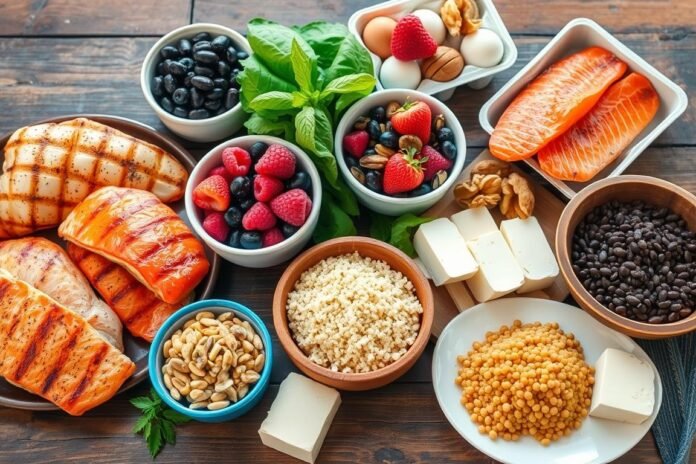Did you know the average American eats only about 15.5 grams of protein per meal? This is less than what’s recommended. Getting enough high-quality protein is key for keeping muscle, managing weight, and staying healthy. In this guide, we’ll look at the top 10 protein-rich foods for a healthier diet.
We’ll cover lean meats, seafood, eggs, dairy, and plant-based options. You’ll learn about their nutritional benefits, how versatile they are, and the best ways to add them to your meals. Whether you want to build muscle, control your weight, or just feel better, this article has the info you need.
Key Takeaways
- Protein is essential for muscle building, repair, and overall health
- Lean meats, seafood, eggs, dairy, and plant-based options are top sources of protein
- Incorporating a variety of protein-rich foods can improve your diet and fitness goals
- Protein powders can be a convenient supplement for those with active lifestyles
- Choosing high-quality, nutrient-dense protein sources is key for a balanced diet
Understanding the Importance of Protein
Protein is a key nutrient that affects our health in many ways. It’s not just for building muscles. It also helps with weight control and feeling full, making it vital for a healthy diet.
Protein’s Role in Muscle Building and Repair
Protein is crucial for muscle growth and repair. When we exercise, our muscles get tiny tears. Protein helps fix these tears, making us stronger and more resilient.
Protein for Weight Management and Satiety
Protein is a great help for those trying to manage their weight. It makes us feel full, which can lower our hunger and calorie intake. This is good for keeping a healthy weight or losing weight.
Also, our body burns more energy when we eat protein. This can slightly increase our metabolism. This helps with weight control.
https://www.youtube.com/watch?v=YHNHpPGlvSY
Knowing how protein benefits us helps us make better food choices. It supports muscle growth, weight management, and keeps us energized and satisfied all day.
Lean Meats: A Classic Protein Source
Lean meats like chicken, turkey, and some beef cuts are great protein sources. They are full of essential amino acids and have less fat. This makes them perfect for those who want to build muscle and eat healthy.
Chicken is a favorite in many homes. It’s lean and can be cooked in many tasty ways. You can grill, bake, sauté, or stir-fry it. Turkey is also popular for its lean protein and can be used in many dishes.
Beef lovers can enjoy lean cuts like sirloin, round, or flank steak. These cuts are rich in flavor but low in fat. You can grill, pan-sear, or add them to stews and casseroles.
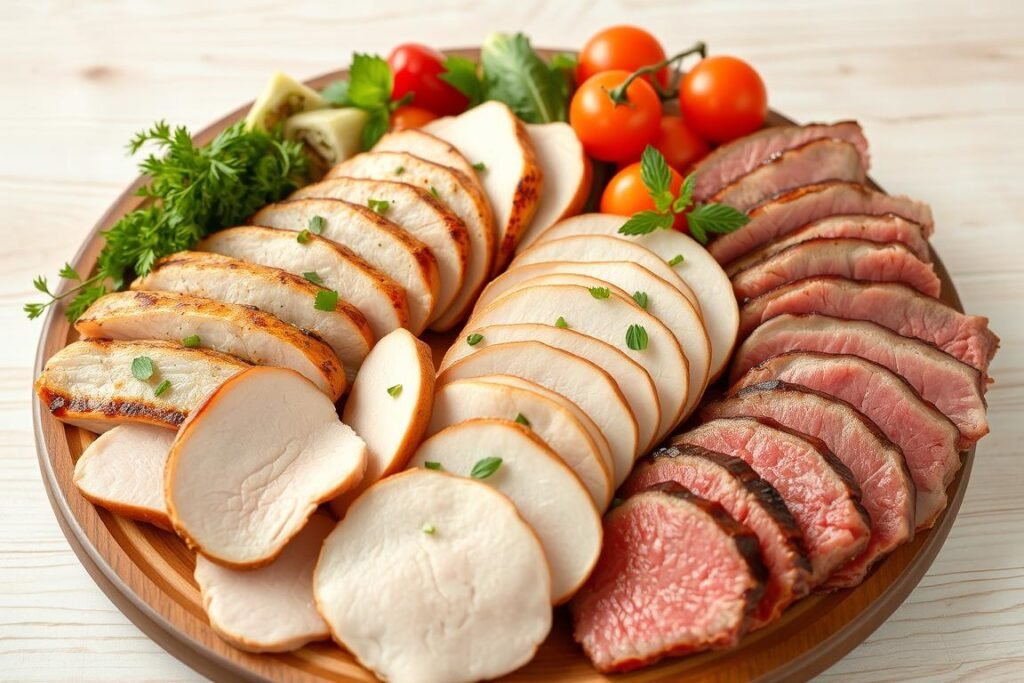
Chicken, turkey, and lean beef are all great for your body and taste buds. They help you meet your protein needs and support your fitness goals. Adding different lean meats to your meals can make your diet more varied and healthy.
Seafood: Nutrient-Dense and Versatile
Seafood is a top choice for protein. It’s full of high-quality protein and essential nutrients like omega-3 fatty acids. Salmon and tuna are two of the best seafood options.
Salmon: A Powerhouse of Protein and Omega-3s
Salmon is great for those looking for protein and heart health. A 3-ounce cooked salmon has 22 grams of protein. It’s also packed with omega-3 fatty acids for overall health and disease prevention.
Salmon is easy to add to your meals. You can grill, bake, make burgers, or salads. It’s a delicious and healthy choice.
Tuna: A Convenient and Affordable Option
Tuna is another excellent protein source. It’s affordable and can be used in many dishes. A 3-ounce serving of canned tuna has 20 grams of protein.
Tuna is also rich in omega-3s. The amount varies by type and preparation. Canned tuna is easy to take on the go, making it a convenient choice.
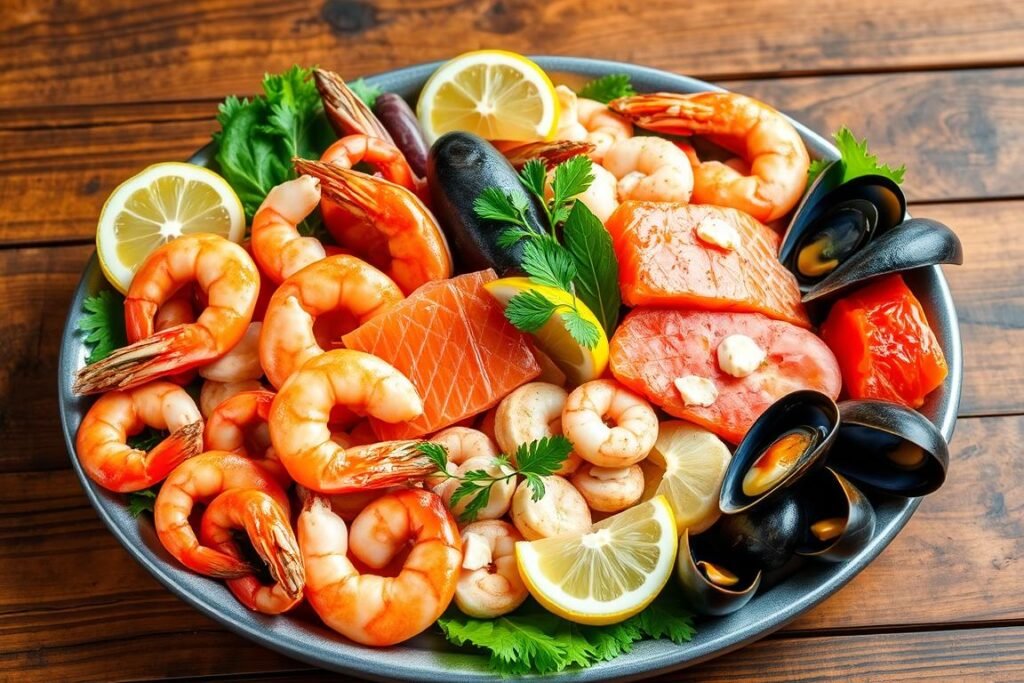
Eggs: Nature’s Perfect Protein Package
Eggs are seen as a top protein source. They are tasty, easy to make, and packed with vitamins, minerals, and amino acids.
Versatility in the Kitchen
Eggs are great for breakfast, lunch, and dinner. They can be omelets, scrambles, quiches, or frittatas. Their versatility makes them perfect for many dishes. You can have them hard-boiled, poached, or fried, adding richness and flavor to any meal.
Nutritional Benefits of Eggs
- High in protein, with one large egg containing about 6 grams of high-quality protein.
- Rich in essential vitamins and minerals, including vitamin A, vitamin D, vitamin B12, selenium, and choline.
- Contain all nine essential amino acids, making them a complete protein source.
- May support heart health, weight management, and cognitive function due to their nutrient-dense composition.
Adding eggs to your meals is a tasty way to increase your protein intake. They offer many nutritional benefits. Enjoy them at any time of day, proving they are a kitchen essential and a natural perfect protein package.

Dairy: More Than Just Milk
Dairy products like milk, cheese, and yogurt are key protein sources. They are not just about protein. They also have essential nutrients that boost health.
Greek Yogurt: A Protein-Packed Snack
Greek yogurt is a top choice for protein. It has more protein than regular yogurt. Its thick texture makes it a filling snack or meal addition.
Greek yogurt is also packed with dairy nutrients. Eating it regularly can improve gut health, strengthen bones, and lower disease risk.
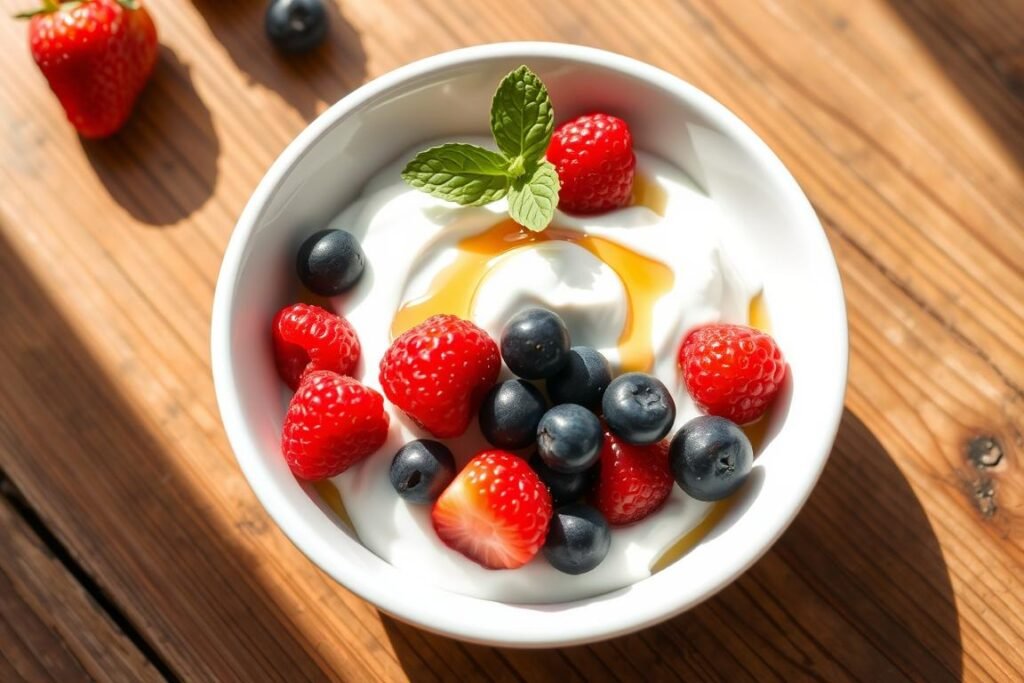
For athletes or anyone wanting a healthy snack, Greek yogurt is great. It’s easy to use in cooking and full of nutrients. This makes it a top protein source.
Legumes: Plant-Based Protein Powerhouses
Legumes are top-notch protein powerhouses in the plant-based world. They include lentils and beans, which are both affordable and full of nutrients. These foods are great for a healthier lifestyle.
Lentils and Beans: Affordable and Nutrient-Dense
Lentils and beans are superstars among legumes. They’re loaded with fiber, complex carbs, and vitamins and minerals. This makes them perfect for adding more protein sources to your diet.
It’s simple and cheap to add lentils and beans to your meals. You can make tasty soups, stews, tacos, and veggie burgers with them. This ensures you always have new ways to enjoy their plant-based protein benefits.
| Legume | Protein Content (per 1 cup, cooked) | Additional Nutritional Benefits |
|---|---|---|
| Lentils | 18 grams | High in fiber, folate, and iron |
| Black Beans | 15 grams | Rich in antioxidants and complex carbohydrates |
| Chickpeas | 15 grams | Excellent source of manganese and magnesium |
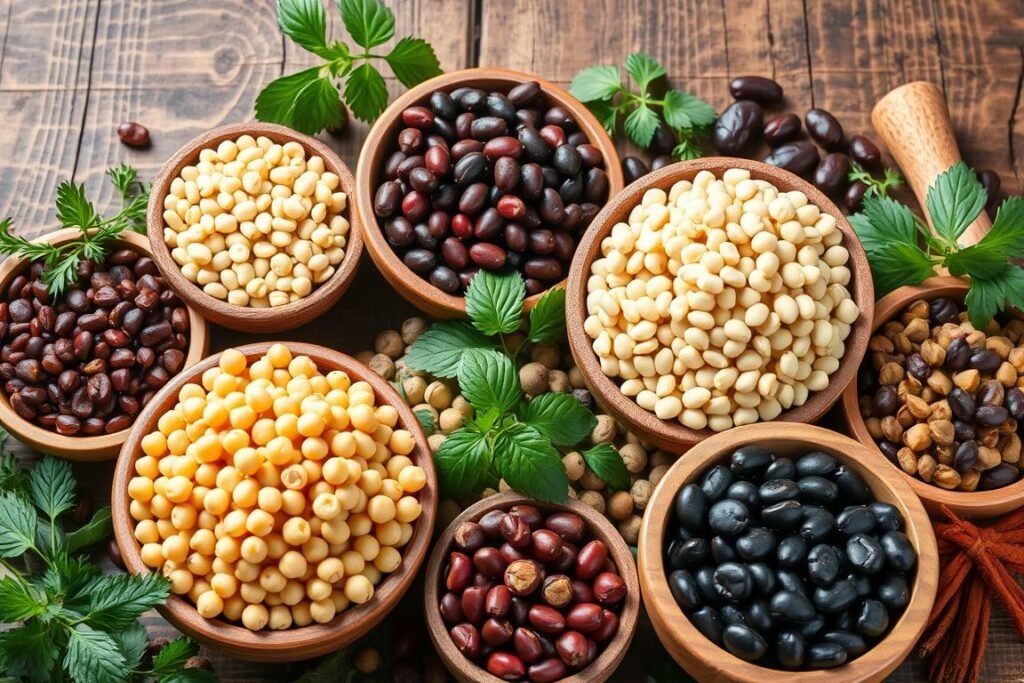
top 10 protein foods
Eating a diet rich in top 10 protein foods is key for good health. These foods give us the amino acids we need. They help build and repair our bodies, keep our immune system strong, and give us energy.
Let’s look at the top 10 protein-rich foods that are great for a healthy diet.
- Lean Chicken Breast: It has 31 grams of protein in every 3.5-ounce serving. Chicken is a low-fat, versatile protein source.
- Salmon: This fish has 22 grams of protein in a 3.5-ounce serving. It also has omega-3 fatty acids that are good for your heart.
- Eggs: Eggs are a classic protein source. They have 6 grams of high-quality protein in one large egg.
- Greek Yogurt: Greek yogurt has 17 grams of protein per cup. It’s a great, protein-rich snack or breakfast.
- Lentils: Lentils are packed with 18 grams of protein per cooked cup. They also have fiber and complex carbs.
- Almonds: A small handful of almonds (about 23 nuts) has 6 grams of protein. They’re a convenient, protein-rich snack.
- Quinoa: Quinoa is a gluten-free grain that’s a complete protein. It has 8 grams of protein per cooked cup.
- Tofu: Firm tofu has 20 grams of plant-based protein per 3.5-ounce serving. It’s a great choice for vegetarians and vegans.
- Tuna: Canned tuna is a cheap, easy way to get 39 grams of protein per 3.5-ounce can.
- Cottage Cheese: Cottage cheese has 28 grams of protein per cup. It’s a versatile, nutrient-dense dairy option.
Adding a variety of these top 10 protein foods to your meals and snacks can help you meet your protein needs. It supports your overall health and wellness. Try different ways of preparing and mixing flavors to keep your diet exciting and fun.
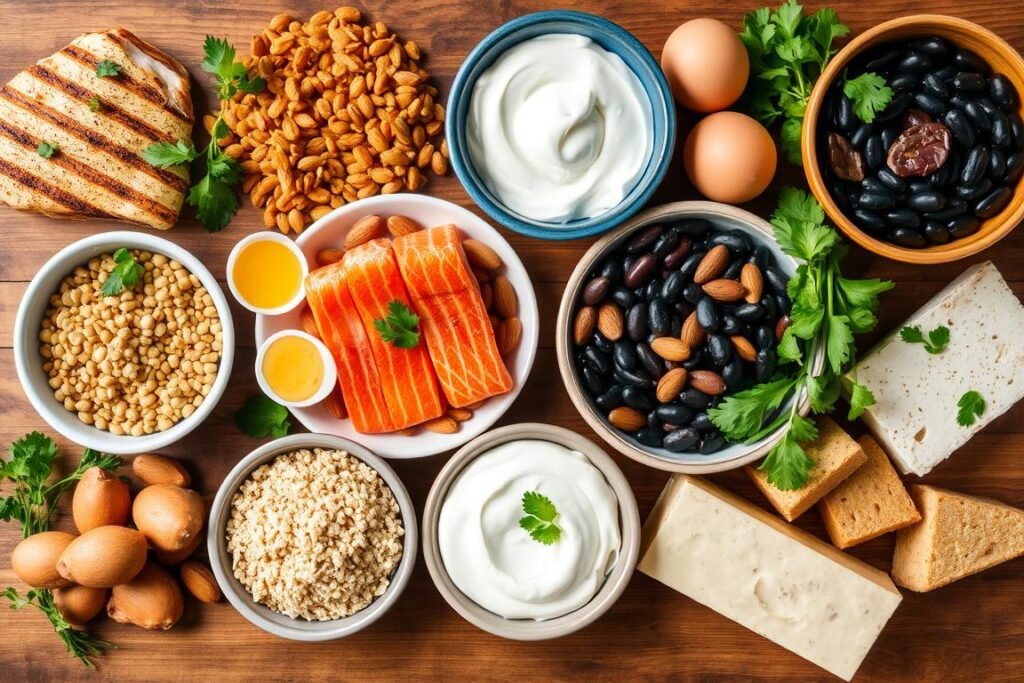
Nuts and Seeds: Portable Protein Snacks
Nuts and seeds are great for quick, protein-rich snacks. They’re full of good protein, vitamins, minerals, and healthy fats. These nutrients help keep you healthy and feeling good.
Almonds and pumpkin seeds are just a few examples. They add variety and protein to your diet. Let’s look at some top choices and their health benefits:
- Almonds – With 6 grams of protein per serving, almonds are a favorite snack. They also have fiber, vitamin E, and healthy fats.
- Walnuts – Walnuts are great for your brain thanks to omega-3 fatty acids. They have about 4 grams of protein and are crunchy.
- Chia seeds – Chia seeds are small but mighty. They have 4 grams of protein per tablespoon, plus fiber, calcium, and antioxidants.
- Pumpkin seeds – Shelled pumpkin seeds, or pepitas, have 5 grams of protein per serving. They also have magnesium, zinc, and other important nutrients.
Nuts and seeds are perfect for workouts, midday hunger, or just a tasty snack. Adding them to your daily routine supports your health and wellness. They’re easy to take with you wherever you go.
| Nut/Seed | Protein (g per serving) | Additional Nutrients |
|---|---|---|
| Almonds | 6 | Fiber, Vitamin E, Healthy Fats |
| Walnuts | 4 | Omega-3 Fatty Acids |
| Chia Seeds | 4 | Fiber, Calcium, Antioxidants |
| Pumpkin Seeds | 5 | Magnesium, Zinc |
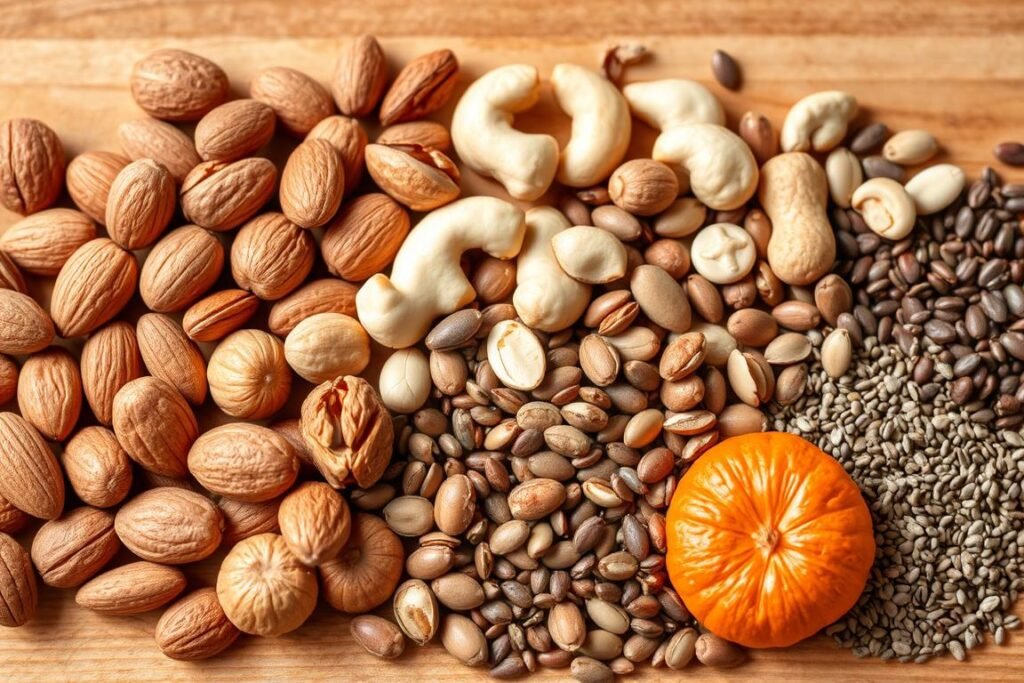
Tofu and Tempeh: Versatile Vegan Proteins
For those on a plant-based or vegan diet, tofu and tempeh are great sources of protein. These soy-based foods are packed with nutrients and can be used in many ways in the kitchen. They are perfect for a vegan lifestyle.
Exploring the Wonders of Tofu and Tempeh
Tofu is a soft, custard-like food made from soy milk. It’s full of plant-based proteins and other important nutrients. It’s very versatile and can take on many flavors.
Tempeh is a fermented soy-based cake with a firm texture and a nutty taste. It’s a complete vegan protein and also has probiotics. This makes it very nutritious.
Cooking with Tofu and Tempeh
It’s easy to add tofu and tempeh to your meals. You can marinate, bake, sauté, or grill them. They work well in many dishes, from stir-fries and curries to crispy appetizers and burgers.
- Slice tofu and pan-fry it for a crispy texture, then toss it into stir-fries or salads.
- Crumble tempeh and use it as a ground meat substitute in tacos, chili, or bolognese.
- Marinate tofu or tempeh in flavorful sauces and bake for a satisfying main dish.
Whether you’re a seasoned vegan or just starting out, tofu and tempeh are great options. They offer endless possibilities to make delicious and healthy meals.
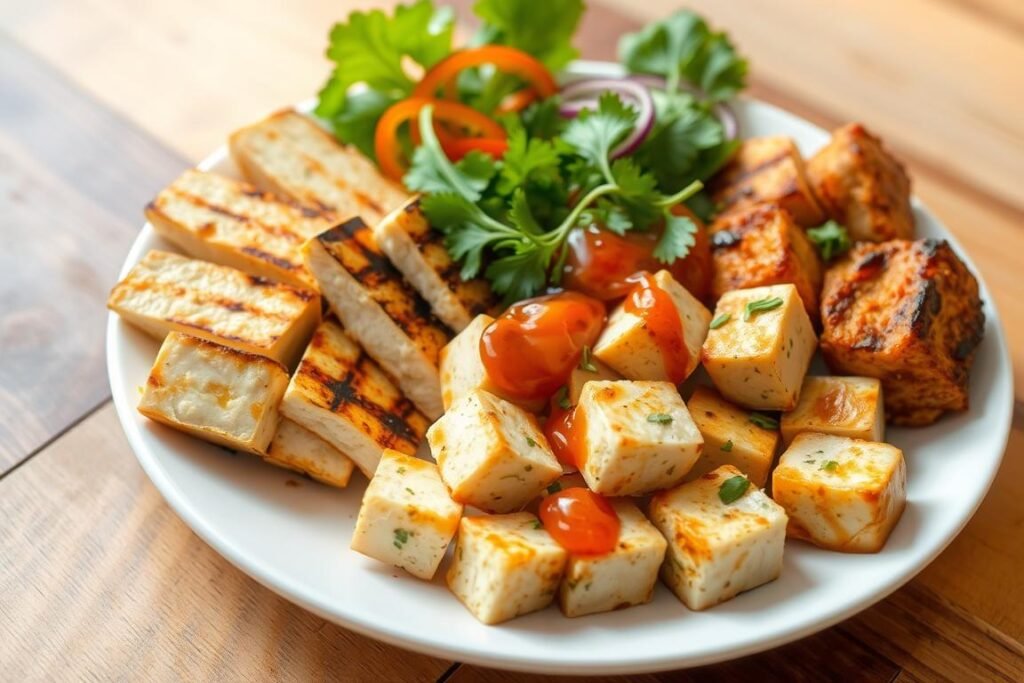
Quinoa: A Complete Plant-Based Protein
Quinoa is an ancient grain from South America that’s now very popular. It’s special because it’s a complete protein. This means it has all the amino acids our bodies need.
Quinoa is a rare gem for those who eat vegetarian or vegan. Its amino acid profile is like animal proteins. So, it’s great for boosting plant-based protein in your diet.
| Nutrient | Amount per 1 cup (185g) of cooked quinoa |
|---|---|
| Protein | 8g |
| Fiber | 5.2g |
| Iron | 2.8mg |
| Magnesium | 118mg |
| Phosphorus | 281mg |
| Folate | 57.2mcg |
Quinoa is not just high in protein. It’s also packed with fiber, minerals, and vitamins. Adding it to your meals can make your diet more balanced and nutritious.
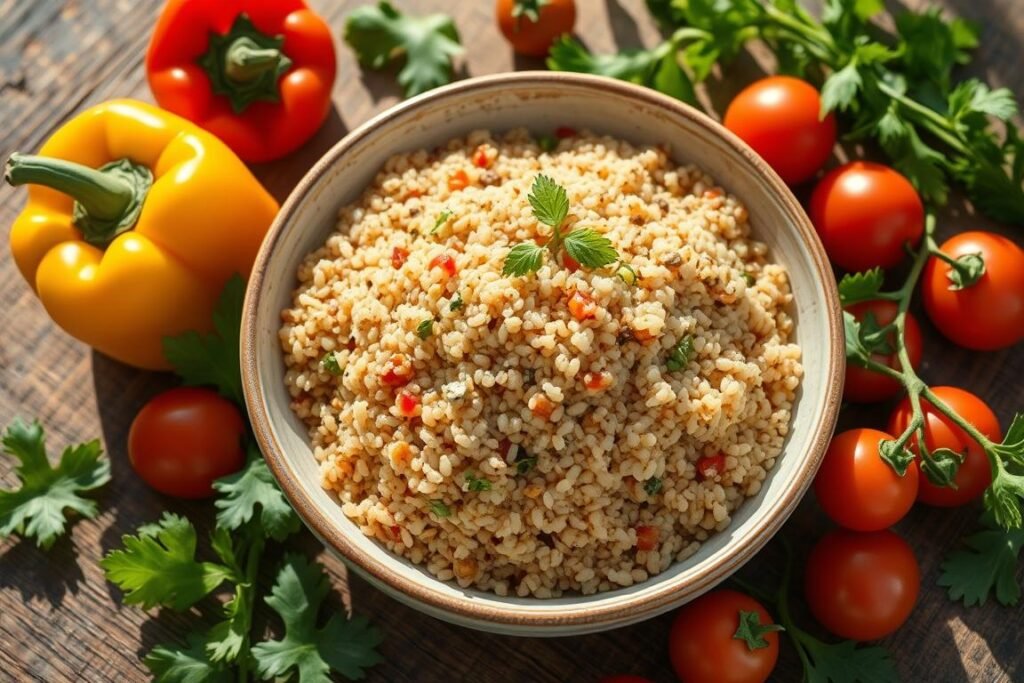
If you love healthy food or want to try new things, quinoa is perfect. It’s easy to use in many dishes. You can make salads, pilafs, baked goods, and even breakfast bowls with it.
Protein Powders: A Convenient Supplement
Looking to increase your protein? Protein powders are a great choice. They are packed with protein and come in many types. They’re good for athletes wanting to build muscle or anyone looking for a healthy snack.
Types of Protein Powders
There are many protein powders out there. Each type has its own benefits. Here are some common ones:
- Whey Protein: Made from milk, whey protein is fast to digest. It’s great for athletes to build and repair muscles.
- Casein Protein: Also from milk, casein is slower to digest. It keeps muscles fed for longer.
- Plant-Based Protein: Made from soy, pea, hemp, or rice, these are for those who don’t eat dairy.
- Egg Protein: Egg protein is easy to digest and has all the amino acids you need.
Choosing the right protein powder depends on your diet and goals. Talking to a health expert can help you pick the best one.
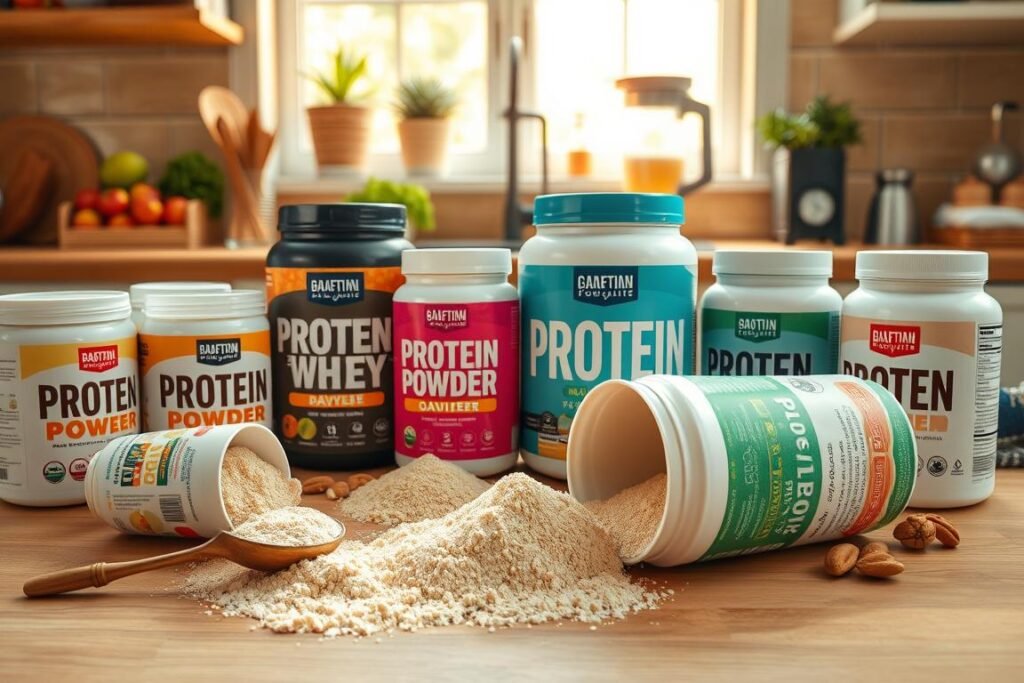
Adding protein powders to your day can be easy. You can mix them into smoothies, bake with them, or just drink them. They’re a flexible way to get more protein in your diet.
Conclusion
The top 10 protein-rich foods we’ve discussed offer a wide range of options for a healthy diet and active lifestyle. You can choose from lean meats, seafood, plant-based, and dairy-based proteins. These choices help you meet your protein needs and reach your wellness goals.
By adding these top 10 protein foods to your meals, you’ll see many benefits. You’ll build muscle, manage your weight, and feel better overall. This is because a high-protein diet supports your body’s health.
This guide is perfect for anyone looking to eat healthy or focus on fitness nutrition. It gives you the knowledge to make smart choices and get enough protein. So, start using these protein-rich foods to become healthier and more energetic.
Remember, a diet full of top 10 protein foods is key to a strong body and a happy life. Try new recipes and let these foods fuel your journey to better health and wellness.


